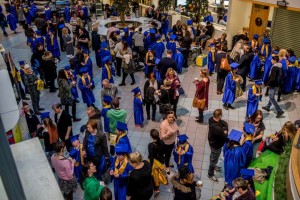There’s a scene in Annie Hall where the Woody Allen character recalls his elementary school classroom. The film transports him back to the classroom as his adult self, surrounded by his classmates as the children he remembers. He wonders what happened to them. In turn, the young pupils stand up and voice what has happened to them since school – playing with stereotypes, some destinations sound apparently predictable and some provocatively unpredictable. It’s a throwaway scene in what’s really a comic movie, but it poses a question about children’s trajectories and outcomes.
Throughout last week, the University played host to much younger people than it usually does. On two evenings, we hosted the awards ceremony for the Sheffield Children’s University. The Children’s University concept was developed over twenty years ago by Sir Tim Brighouse, the inspirational educationist who led Birmingham’s education services in the 1990s. He saw it as a way to raise aspirations and to get young children thinking about a word and an idea which seemed very distant for too many of them. It now draws together a wide range of out-of-school learning and uses participation in this as a way of building up ‘credits’ to Children’s University awards. The Sheffield Children’s University is one of the largest in the country – more than 37,000 pupils have participated in Children’s University activities, between them clocking up over two million hours of out-of-school learning. On Wednesday and Thursday evening, in the Pennine lecture theatre, we welcomed several hundred of them to receive their awards, decked out in scaled-down caps and gowns.
There are few audiences more demanding than young children – as the now widely-watched Professor Robert Kelly knows only too well. They sat (mostly) with great patience through the presentation of awards, which was a remarkable achievement given that many were as young as six, seven or eight. They were – almost all of them – in a completely new environment, in buildings and teaching rooms on a scale quite different to those they are used to. Sheffield Hallam’s engagement with the Children’s University is well established, and it is an important part of our wider mission to extend horizons and raise aspirations. A much better speaker than me captured this by inviting the children to look around the lecture theatre for a doctor, a gas engineer, a scientist – his point was that these young children could and perhaps would be those things – the youngsters couldn’t see them, but he encouraged them to imagine.
On Thursday, the Department of Media Arts and Communication hosted a BBC Newsday, welcoming students from three Sheffield schools to the MAC news room. The BBC Newsday invites school pupils to be journalists for a day, putting together story packages, researching the content, scripting the news item and presenting it in either text, audio or visual media. This was the first time the University had engaged substantially with Newsday, and it was good fun to be able to see the youngsters pull together news stories and feature items.
Both the Children’s University and the Newsday event drew youngsters into the University – the CU event also drawing in parents and carers. For most of them, it was their first time in this, or any other, university. Because we work here, we take so much about the way the University works for granted. But that’s a mistake. Universities can be forbidding places for those who are not familiar with them.
A major new piece of work is getting underway to further enhance the University’s widening participation mission. The National Collaborative Outreach Project (NCOP) is a large scale HEFCE-funded project which is focused on accelerating participation in higher education in low participation wards. Sheffield Hallam is leading the project in south Yorkshire, working in partnership with the University of Sheffield in one of the biggest NCOP projects nationally. The over-arching lesson of efforts to extend participation in higher education is that there are few short cuts: universities need to work collaboratively, with each other, with colleagues and with schools, and to do so through multiple routes. Last week’s events were visible symbols of our engagement.

‘Children can only aspire to what they know exists’ – This reminded me of a critical mathematics educator – Ole Skovsmose’s – formulation of the importance of ‘foreground’ as well as background.
“If we want to understand the learning activities of students. and the way they engage in learning processes, it is important to understand what they consider to be their foreground and their possibilities in life.”
Open access –
http://flm-journal.org/Articles/5B7F579B6B72D19BC3C629D03A5B83.pdf
In a world where 50% of children will end up doing jobs that do not yet exist, in many cases using technology that does not yet exist I could not disagree more. We should be inspiring children to create the future not trying to get them to fit in with a future that we imagine.
These are excellent examples of collaboration and will certainly have informed and inspired those young people to aim high. Basing activities within a university as well as delivering outreach activities can help to make higher education an accessible option for young people and their families. They gain direct experience of incredible resource banks- the staff, the students and the facilities.
As the recently appointed HEPP Director (week 4!) and lead for the new National Collaborative Outreach Programme the sub region has a fantastic opportunity to further engage local schools and colleges to significantly increase the numbers of young people from disadvantaged backgrounds in South Yorkshire progressing to higher education.
The programme is called HeppSY+ and builds on the HEPP brand and HEi partnership work that schools and colleges are already familiar with. If you want to find out more or get involved please don’t hesitate to contact me. I look forward to hearing from you.